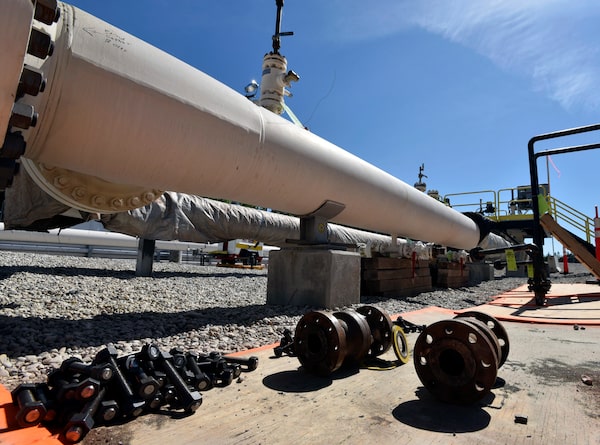
Enbridge’s 1,038-kilometre pipeline is a crucial energy source for Ontario and Quebec that transports up to 540,000 barrels of petroleum a day – mostly from Western Canada.Dale G. Young/The Associated Press
The Line 5 energy pipeline is facing another threat of shutdown: a Wisconsin Indigenous band has asked a U.S. court for a quick judgment on an application to evict the pipeline from its land.
The Bad River Band of the Lake Superior Tribe of Chippewa, which filed its application earlier this year, is asking a U.S. federal court for a permanent injunction that would require owner Enbridge Inc. ENB-T to “cease operation of the pipeline and to safely decommission and remove it.”
This latest risk to Line 5 is on top of an effort by Michigan Governor Gretchen Whitmer to cease the pipeline’s operations over fear of an oil spill in the Great Lakes. The Canadian government is trying to quash that attempt via negotiations with the United States.
Enbridge’s 1,038-kilometre pipeline is a crucial energy source for Ontario and Quebec that transports up to 540,000 barrels of petroleum a day – mostly from Western Canada. It takes a route to Ontario through Wisconsin and Michigan before re-entering Canada at Sarnia, Ont.
Enbridge spokesperson Jesse Semko said the risk to Line 5 from Wisconsin, like the Michigan shutdown effort, is contrary to a 1977 treaty between Canada and the U.S. intended to “ensure the uninterrupted transmission” of pipelines.
If Ottawa wants to take up the matter with Washington, it would likely have to invoke the treaty again, as it did with Ms. Whitmer’s shutdown order, international trade lawyer Lawrence Herman said.
Easements granted for Line 5 to cross the Bad River Band’s reservation have expired, and while Calgary-based Enbridge has proposed to reroute the pipeline around the land, the Indigenous group is not prepared to wait.
The pipeline’s future was put in jeopardy in 2021, after Ms. Whitmer ordered it shut down over fears of a spill where it crosses the Straits of Mackinac waterway in her state. It remains in operation, and Canada and the U.S. are in negotiations over the matter after Ottawa invoked the 1977 bilateral treaty.
The application for summary judgment in Wisconsin asks the court to rule on the Bad River Band’s lawsuit without a trial.
Mr. Semko said the company filed its opposition to the summary judgment request in late April.
He noted that the Wisconsin band granted permission via a signed agreement 1992 for Enbridge to operate on the reservation until 2043.
The 1977 treaty says the only justifications for impeding the flow are natural disasters or emergencies – and these may only be temporary interruptions.
Labour unions on April 25 filed an amicus brief in the Wisconsin case in support of Line 5, underscoring the prospective economic impact and job losses that would occur if Line 5 were closed. “Thousands of workers whose livelihoods, families and communities depend on the safe and consistent operation of Line 5 and the industries Line 5 feeds” would be hit by a shutdown, said a brief from North America’s Building Trades Unions, the United Steel Workers and the American Federation of Labor and Congress of Industrial Organizations.
Mr. Herman said the U.S. government would press Canada to live up to the 1977 treaty if the situation were reversed and a pipeline from the U.S. was at risk in Canada. He noted the treaty was initiated by Americans concerned about Canadian interference in U.S. pipelines that would cross Canadian territory.
“The U.S. government would be jumping up and down and pounding the table and demanding that Canada as a country meet its U.S. legal obligations,” he said.
“The U.S. has a treaty obligation to meet its guarantees for pipeline transit.”
Enbridge is planning a 66-kilometre relocation project to route Line 5 around the Bad River reservation. “Agreement has been reached with 100 per cent of private landowners along the reroute, chosen because it minimizes environmental impacts and protects critical resources,” Mr. Semko said. “Enbridge will move forward with construction once all necessary permits are received.”
The Canadian government said it would not file a brief opposing the Bad River Band’s application.
“Line 5 is an important element of Canada’s energy security, and we are closely monitoring the application in question,” Keean Nembhard, press secretary for Natural Resources Minister Jonathan Wilkinson said in a statement. “While we remain in close touch with Enbridge and other stakeholders, the government has determined that it will not be filing an amicus in this case.
“The government of Canada has publicly supported Enbridge’s proposal and the regulatory process to reroute Line 5 off of the Bad River band’s territory.”
For subscribers: Get exclusive political news and analysis by signing up for the Politics Briefing.
 Steven Chase
Steven Chase